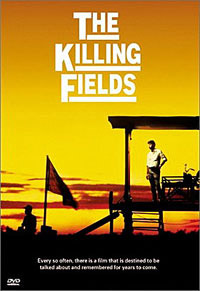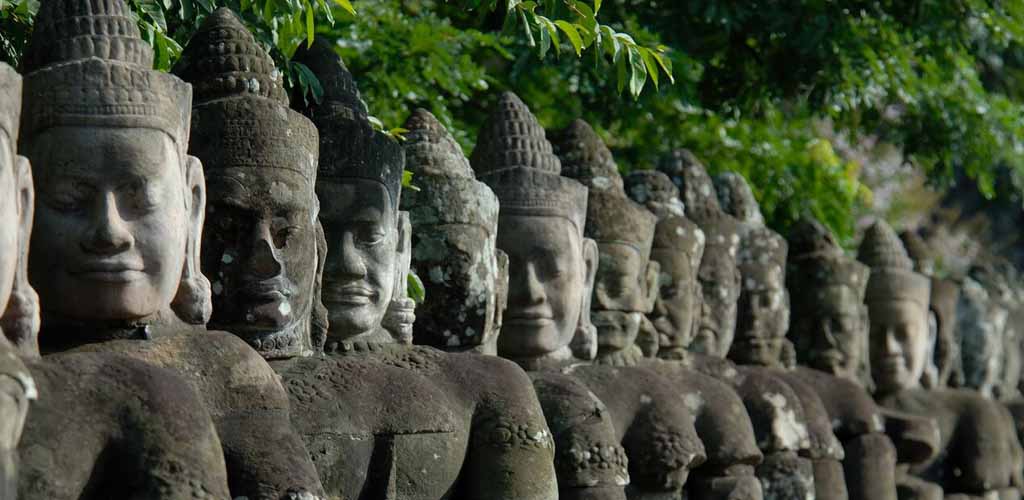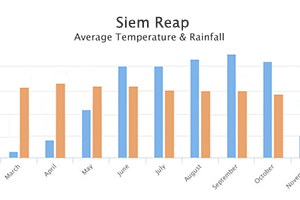Cambodia Travel Notes
Greetings and thank you for joining us for the trip of a lifetime for there is no place in the world quite like Cambodia. First and foremost, despite any challenges you may have heard or read about the region, we are here to ensure your trip goes not only smoothly, but is one of the most remarkable you've ever had. For us, your trip preparation begins well before you depart with careful planning and arrangements.
About 60-90 days before your depart, you will receive printed materials from us in your pre-tour packet. Please inspect and read these documents carefully, some, such as your visa on arrival authorization form, may be required for entry into the country you are traveling to. Most of these documents are posted here if you wish to get an early start. Of course, please don't hesitate to contact us with any questions you may have. We would also be happy to place you in contact with our past travelers for their advice.
Cambodia Trip Planning
Important Dates
Mid-April - Khmer New Year.
October 29 - Khmer New Year,
AIRLINES
Contact us for quotes and suggested routing and carriers. Main regional hubs for arrival are Bangkok, Singapore and Hong Kong, though some other cities also have direct flights.
TRIP COST
Private trips from US$500/day per person
CAMBODIA WEATHER
Cambodia is always hot, year-round you may expect temperatures averaging in the 80s. Monsoons come mid-July through September. If you're considering beach resorts, pay attention to the rainfall chart below. We can find other options in the region with less rain, if your dates are set.
Best Months : November - March
Warm : April through June & October
Rainy : mid-July through September
BOOK TO PACK
 The Killing Fields
The Killing Fields
Covering the darkest period of any civilization ever known. An engrossing, horrific story made into an Academy Award winning film. The killing fields is a story about war and horror, murder and terror but also about hope and friendship. The story emerges in the early 1970s in war torn Cambodia, where the communist Khmer Rouge are trying to overthrow the American backed government of Lon Nol. The American journalist Sydney Schaumburg and his Cambodian assistant Dith Pran are covering the advance of the Khmer Rouge towards the capital of Phnom Penh. [More books and film on Cambodia]
TRAVEL INSURANCE
- Japan is the most expensive travel destination in the world.
- Finer hotels can fill up to a year in advance
BEFORE YOU GO
Our comprehensive pre-tour cover every detail of your trip and travel in japan.
Japanese Travel Myth Number 1
"The Japanese practice a refined culture and care must be taken not to offended". Relax, there are certainly some no-nos to avoid when traveling in Japan (such as touching people) but even if you speak impeccable Japanese and are unfailing polite, you are and will always be gaijin(foreigner).
Introductory Information
Emergency Contacts & Insurance
All travelers (except to China) should be covered for emergency medical and air evacuation insurance, such as through the Global Traveler Program by International SOS. International SOS operates its own medical clinics and offices in-country with locations in Bangkok, Phnom Penh, Yangon, Beijing, Shanghai, Hue, Hanoi, and Saigon and provides travelers with air evacuation services to Singapore or Bangkok if deemed necessary. Please note: the SOS Global Traveler Program does not cover air evacuation to any location but Singapore or Bangkok nor subsequent medical expenses after evacuation, please supplement this insurance with your own coverage.
Indochina Travel is not affiliated with SOS International and does not warrant any claim or responsibility for their services: Travelers are ultimately responsible for contacting with SOS and arranging for services required.
Cancellation, Delay and Travel Insurance
Indochina Travel requires travelers are covered by some form of trip cancellation and delay insurance. Over the years we have experienced many travelers have to cancel or have their trip delayed for the most unexpected reasons. Such insurance will likely include additional medical, lost baggage, and other coverage. We are a longtime provider and have a good relationship with CSA Travel Protection, one of the major insurance companies and would be happy to provide a quote.
Security
Despite the region's history, Indochina and Myanmar are now amongst the safest places in the world to travel where physical crime against travelers is unheard of and even theft is rare. When traveling with us, please entrust your your possessions and valuables to your vehicle, always carefully watched by your driver. When not with us, please leave your valuables and travel documentation in your hotel safe.
Weather
Please see our general weather page for overall climate information in the region. For specific weather and historic climate information, we recommend two sites: Weather2 and Tu Tiempo.
Luggage
Check-in luggage on most international carriers is now restricted to one bag weighing no more than 50 lbs. (23 kg). Regional and domestic carriers limit bags to 40-44 lbs (18-20 kg) and may charge steep overweight fees. There is no limit to hand luggage or carry-on luggage weight as it is not typically checked except for size.
Money Matters
Plan on bringing U.S. Currency for most expenses, which remains widely accepted throughout the region and indeed, is the only acceptable currency for some transactions such as visa fees or airline departure taxes. Although you may use credit cards (except AMEX) for fine dining and larger purchases in Indochina, only cash is accepted in Myanmar. Please refer to your country departure notes (below) for suggested amounts and denominations to bring. ATMs are common in larger cities but may be inconvenient and unreliable. Travelers checks carry a hefty 4% surcharge to cash.
Internet & Telecommunications
Wifi or wired Internet is now ubiquitous in regional hotels, airports and even cafes. Myanmar and northern Laos can have reduced speeds, but WiFi or wired Internet is now ubiquitous in regional hotels, airports and even cafes. Myanmar and northern Laos can have reduced speeds, but connection is still easy to obtain. Note that your mobile phone will work fine with a roaming plan in Indochina (coverage in Vietnam is excellent), even in remote areas, except in Northern Laos where coverage can be spotty. In Myanmar, no foreign carriers have coverage. For Myanmar, mobile phones with international calling capability may be rented at the Yangon airport with pre-paid SIM cards from US$20-50.
Electrical

Most hotels in Indochina and Myanmar now use clever dual French and American style outlets, accepting both type of plugs. Your iPad, Kindle, laptop, mobile phone, and camera adapter will likely accept the 220-volt current automatically, but check the fine print on the adapter.
Tipping
Note that with the exception of Thailand, Japan, Hong Kong, and Singapore, all tipping in Indochina and Myanmar tipping is preferred in US dollars. Tipping is not expected in restaurants, where like in Europe a service charge is typically included in the bill. For informal, street cafes a small tip is appreciated. An appropriate tip for hotel porters and other service providers is $1-2. Cleaning staff get about $2 a day, left at the end of your stay on the nightstand, where it's easily visible. Masseuse, $5 to $10. For guides, the range for tipping, dependent on your satisfaction of course, is from $20-100 per day for a couple (double this amount for families or small parties). For larger groups, an appropriate range is $100 and up for your entire party/per day. Drivers are tipped about half the guide rate. Two dollar bills are valued souvenirs in Vietnam. In Vietnam, baseball caps and hometown collegiate t-shirts are also prized gifts.
Departure Notes
Please note: a comprehensive, printed pre-tour packet will be mailed upon confirmation of your trip. The pre-tour materials cover far more than the brief listing of key topics here and contain a wealth of advice and essential information to make your trip as enjoyable as possible. Please read them carefully before your arrival. You may also peruse our Traveler Resources Page for more detailed information regarding visas, packing and reading lists and more.
VISAS & PASSPORT REQUIREMENTS
All visitors to Southeast Asia must be in possession of a valid passport, with at least six months unexpired validity from the date of your departure from the area. A visa or visa on arrival (VOA) must be obtained before entering Vietnam (obtained through Indochina Travel. Visas for Cambodia and Laos are issued upon arrival with no prior permission required. Thailand, Hong Kong, and Singapore require no visa for U.S. or U.K. travelers. Although Indochina Travel may facilitate the securing of visas, it is ultimately the responsibility of each individual traveler to ensure that they are in possession of any necessary and valid visa and/or documentation and Indochina Travel assumes no responsibility for the consequences of any failure to comply.
When traveling in a developing country, preparation is our hedge against unexpected but common issues that may arise during a trip. Enclosed in your pre-tour packet is a Tour Guide booklet, which provides useful information about Myanmar and your tour, please read the enclosed documentation carefully to prepare for your trip. Despite careful prep era ti on and planning, please be prepared for events which may change our plans.
LUGGAGE
Regional and domestic airlines restrict luggage to one piece with a weight of no more than 20 Kilograms (44 pounds) per person. Your passport, travel documents, jewelry, money, camera, fragile items and any medication should be hand-carried and not checked in. On domestic flights, each passenger is allowed one piece of hand luggage. When planning your packing, please bear in mind on your trip may be constantly on the go, staying in a new hotel at least every other day and you'll want to pack lightly for mobility and convenience as well as have a day pack for your van. Checked luggage is required by the local authorities to be at the airport two hours prior to your flight departure. If we are arranging check-in for you, then we need to arrange collection of all bags before your departure in order to complete all check in formalities for you. Please remember to retain your travel documents and any hand baggage.
TRANSPORT
Some road conditions in Indochina remain quite poor and traveling by car, bus, and bike can be bumpy. Most available cars and coaches are quite old and therefore not in perfect condition, however rest assured we will always do our utmost to arrange cars or buses of the best possible local quality available for your transfers and tours.
HEALTH & IMMUNIZATIONS
While no immunizations are formally required, malaria prophylaxis is often recommended for travel in remote areas. As health requirements change without notice, please check with Centers for Disease Control, physician or public health service for current required or recommended inoculations. The biggest health risk and the most common with our past travelers is stomach issues. Drink only bottled or boiled water and tea. Food should not be purchased from sidewalk vendors without recognizing you face a greater risk of getting a bug and avoid any raw greens and vegetables.
Insect repellent should be brought, especially up-country and in wooded areas (we recommend 3M's Ultrathon in spray bottle). Recent news articles have mentioned a general increase in Dengue fever risk in SE. Asian countries. The tropical sun can burn in minutes, bring wide brim hat, sunshirts and a sweat proof sunscreen (we like Bullfrog gel and spray). All travelers are required to have medical-evacuation insurance. Hospitals in Indochina are inadequate for advanced medical care, although a few private clinics may provide emergency care, in the event of serious illness or injury, medical evacuation to Bangkok or Singapore will be recommended.
EMERGENCY
Indochina Travel is proud to be the only tour company to provide International SOS Emergency evacuation insurance. Since 1998 we have experience using their emergency clinics and have used their private jet emergency evacuation services a few times. Although guides and local managers are trained in the procedures of working with SOS in the event of an emergency, travelers may also contact International SOS independently and use our contract number MEMBERSHIP #: 12148-B.
Click to view International SOS Alarm Centers and Clinics in Asia
MONEY MATTERS
For convenience, plan to bring enough US cash for your trip (in mint-condition bills), as there are few ATM machines and credit cards are not widely accepted, and not all foreign currencies (other than US dollars) and travelers cheques are not accepted in Indochina. If you intend shopping for souvenirs, you will need to ensure that you are carrying sufficient US Dollars in small denomination notes that are in mint condition. Only payment for extra charges in larger hotels may be made by Visa and MasterCard. Note: American Express is not widely accepted in Indochina nor much of Asia). On tour your expenses will be limited to visa on arrival fees (US$25), some meals, souvenirs, airline departure fees, and gratuities (about $20-50 per day for your guide, about half that for your driver).
Vietnamese currency is known as the 'dong'. The official rate is about 21,000 dong to the dollar. Dollars may be changed into dong at a good rate in your hotel. Major hotels and a few restaurants will charge in USD but most other expenses in Vietnam, Laos and Cambodia may be made in USD or local currency.
COMMUNICATIONS
Your mobile phone will work in Indochina, although at a high roaming rate. An inexpensive, international handset may be rented from Indochina Travel. Current rental rates from this vendor as of September, 2011 are $4/day for phone and $2/day for domestic SIM card, in additional to pre-paid cards from US$12 to $50 for international. Coverage is quite good along the "classic" route (not in very remote areas).
Internet is widely available at hotels with decent bandwidth, but is unreliable in remote areas. Please plan accordingly.
ELECTRICAL

Electricity in Indochina is typically 220-volt although 110 volts can found as well. What does this mean for you? Not much, your iPad, Kindle, mobile phone, digital camera and laptop adapter will take the higher voltage without issue. However, check the fine print just in case. Devices with motors and no adapter, such as hairdryers, will burn out (almost all hotels do provide hairdryers). Electric power sockets come in varieties, including round two-prong with dual US style outlets (at most luxury hotels). Your Kindle, camera, laptop or other device should automatically accept 220-volt without issue, but check your adapter fine print. Sporadic power outages are common.
WHAT TO WEAR
Light clothing is adequate for Indochina and most low-land tourist areas. High elevations around Luang Prabang may reach near freezing at night during the 'winter' season but is usually pleasant during the day. Travelers should bring appropriate cold weather clothing during the winter. Revealing clothing is not welcome in this conservative and largely Buddhist region. When visiting religious shrines and temples, modest dress is required and easily removable footwear is recommended since such sacred grounds must be visited only in bare feet (no socks). A sarong is handy for covering up before entering religious sites (not required for Angkor). Bring a hat and sunglasses, and umbrella for rainy season.
WHAT TO EXPECT
This is not a grand tour of Europe, but hopefully why you have come - for an authentic, deep cultural experience in countries closed off to the world for decades. You will be very safe, always looked after, can expect wonderful service, and a comfortable and a typically pleasant if not exceptional trip. However, Indochina remains a primitive, undeveloped country with the inconveniences are random issues that arise with travel in such places.
FREQUENTLY ASKED QUESTIONS
Is Indochina safe for travel?
Very much so. Our past travelers always cite how warm and friendly people are, always one of their strongest impressions. Tourists have now visited going on two decades without any issues of violence. Rather, almost every traveler on our tours in the region have been struck how tranquil the country is and how warm and gracious people are to visitors and whose hospitality we've been enjoying since 1994. We'd be happy to put you in contact with our past travelers for their impressions.
What is the weather like?
Daytime temperatures can reach the high 70s between September through December. In January through April, temperatures steadily climb and at lower elevations we can expect 80 to 90s F. Higher elevations like Luang Prabang, located at nearly 1,000 feet is temperate and cooler this time of year.
GIVING
No doubt you will be moved by the wonderful people you meet along the way. many who live in poverty. It may be hard not to feel compelled to give something, but think about doing so will change the dynamic of your people encounters and those who follow you. If you do feel compelled to give, we recommend pens, simple to carry with you, useful and beyond the budget of most families. We never encourage giving money, candy or the like. For giving before or after your trip, we recommend these charities.
CONTACT US
With over 20 years experience in Indochina, we know our stuff! Please contact us with any questions you may have, either in our San Francisco reservations office at (415) 418-6800 or our headquarters in Hanoi at 011 (84-4) 3562-6665.


